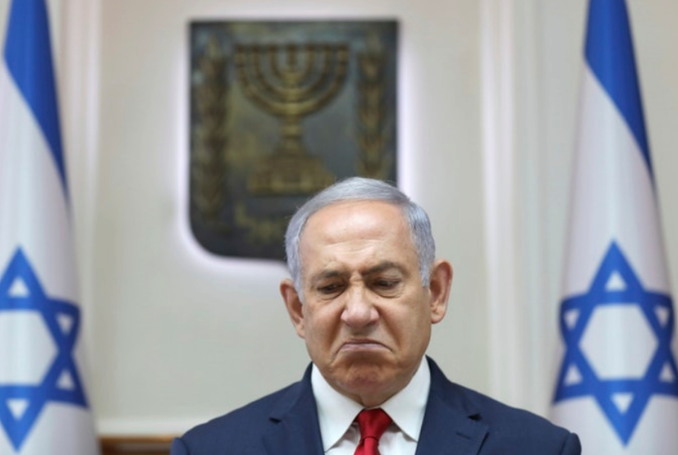
The Palestinian Prisoners Club described Israel’s delay in releasing the seventh batch of prisoners in the exchange deal as “organized terrorism.”
The office of Israeli Prime Minister Benjamin Netanyahu announced tonight that, due to what it described as violations by Hamas, the release of Palestinian prisoners has been postponed until guarantees are secured to ensure the release of detainees without ‘humiliating’ procedures.
Netanyahu’s office stated that “Hamas deliberately insults the dignity of detainees and exploits them to promote political goals.”
Israeli media outlets, citing sources, reported that Palestinian prisoners were placed on buses but were then taken off and returned to their detention cells.
Meanwhile, the Palestinian Red Crescent said its teams withdrew from Hadassah Hospital in Jerusalem after the handover of the injured prisoner, Kazem Zawahra, was canceled.
The Palestinian Prisoners and Released Prisoners Affairs Authority confirmed that the occupation has postponed the release of Palestinian prisoners until further notice.
Earlier, the rights organizations had stated that it was preparing to receive the bus transporting the released prisoners. However, sources told Al-Jazeera that the occupation’s intelligence informed the families of Jerusalemite prisoners at the Maskobiya detention center that the release would occur soon.
The families of the prisoners had gathered in front of the European Hospital in Khan Younis, southern Gaza Strip, awaiting the arrival of their loved ones.
The Israeli Broadcasting Authority (KAN) had stated that Israel decided to delay the release of the seventh batch of Palestinian prisoners as part of the first phase of the ceasefire and prisoner exchange agreement. This decision came in response to Hamas sending a Palestinian body instead of Shiri Bibas, after Hamas released six Israeli prisoners in Gaza on Saturday.
It was expected that the release of approximately 600 Palestinian prisoners would begin on Saturday afternoon. However, Israeli media reported that Tel Aviv postponed the process until after a security meeting chaired by Netanyahu, and that the procedures might begin at midnight.
Among the prisoners to be released in the seventh batch are 151 prisoners with high sentences and life terms, and 445 prisoners detained by the occupation from the Gaza Strip after October 7, 2023.
It is planned to initially transfer 97 of these prisoners to Egypt. This batch also includes 41 prisoners who were freed by the resistance in the 2011 Gilad Shalit deal and were rearrested by the occupation.
Palestinian Prisoner Release Delayed as Israel Holds Security Talks
KAN had stated that the security meeting, which began on Saturday evening, would make decisions regarding the upcoming week and the continuation of the ceasefire.
It clarified that the meeting discusses Israel’s commitment to the agreement, the recovery of the remaining bodies of Israeli prisoners in the first phase, and the withdrawal from the Philadelphia Axis (Salah al-Din Axis) in the southern Gaza Strip.
KAN also quoted a member of the Israeli negotiation team as saying that there are “doubts about the possibility of extending the ceasefire without progress in the talks and providing a horizon for Hamas.”
Earlier, Israel’s Channel 12 reported, citing sources, that the government would decide on steps regarding the release of Palestinian prisoners after these security consultations.
For its part, the Israeli Prisoners’ Families Association stated that Netanyahu is obstructing the exchange deal to satisfy his coalition partners at the expense of the detainees.
The association added that the government is hindering the transition to the second phase and called on US President Donald Trump to pressure Israel and return the prisoners in one batch.
This comes as the Israeli newspaper Yedioth Ahronoth reported that estimates suggest Hamas may agree to extend the first phase in exchange for Israeli concessions, including increasing the number of Palestinians released for each prisoner. The newspaper indicated that the concessions Israel might offer also include increasing aid, introducing temporary housing, and heavy equipment.
The newspaper noted that the chances of reaching an agreement on the second phase within a week are slim and stated that Israel is preparing to begin negotiations for the second phase, whose form and location remain unclear.
Commenting on Israel’s delay in releasing prisoners, Hamas spokesperson Abdul Latif Al-Qanou stated that the occupation’s failure to release the seventh batch of prisoners as agreed represents a “blatant violation of the agreement.”
He added that “while Hamas has responded to mediators’ efforts to make the exchange process successful, the war criminal Netanyahu continues to procrastinate and delay the release of prisoners.”
Al-Qanou called on mediators and guarantors of the agreement to pressure the occupation to implement the terms of the agreement without delay or procrastination.
Six Israeli Detainees Released in Gaza in Exchange for 602 Palestinian Prisoners
In the same context, the media official at Hamas’ Martyrs, Wounded, and Prisoners Office, Nahed Al-Fakhouri, stated that “there have been delays and violations by the occupation regarding the release of prisoners.”
He explained that the occupation has assaulted prisoners and is attempting to manipulate some of the names of prisoners scheduled for release.
For its part, the Palestinian Prisoners Club described Israel’s delay in releasing the seventh batch of prisoners in the exchange deal as “organized terrorism.”
On January 19 of last year, the ceasefire and prisoner exchange agreement between Hamas and Israel came into effect in its first phase, which lasts for six weeks. This followed a 15-month war of annihilation against the Gaza Strip, which resulted in the killing and injury of more than 160,000 people, most of them children and women, and massive destruction unprecedented since World War II.
(AJA, PC, Israeli Media)